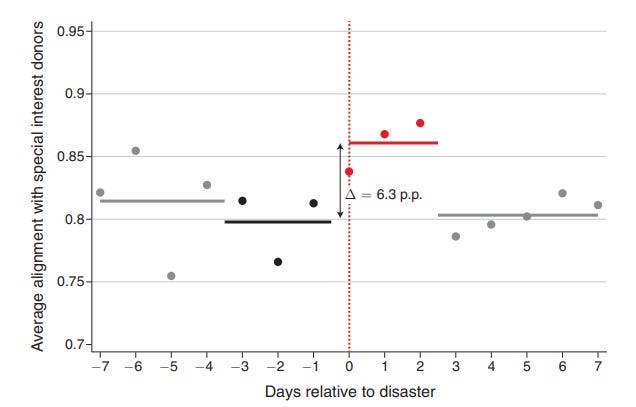If you need another reason to hate lobbyists
Lobbyists for special interest groups are, let’s say, not the most highly regarded people in the political ecosphere. It’s not just that the public doesn’t like politicians; politicians and the public alike tend to dislike lobbyists even more. But in case you need another reason to find them morally depraved opportunists read on.
A recent paper in the American Economic Journal investigated the voting behaviour of US politicians around the time when major natural disasters strike. Obviously, whenever there is a natural disaster like a hurricane or a wildfire, the news focuses on this event, rather than the day-to-day events on Capitol Hill. In other words, the pressure to perform for the public, which is intense in a world of social media and 24-hour news channels, is reduced.
That should be great news because it gives politicians a little bit more leeway to vote their conscience rather than the official party line or engage in performative speeches in Congress. Democracy should work a little bit better if the public eye is directed towards the unfolding natural disaster.
Either that or politicians feel less inhibited to pander to their donors and the lobbyists representing special interest groups.
The chart shows how much a politician’s vote in Congress aligns with the interests of their largest donor during the two weeks around a natural disaster. In the three days after a disaster strikes, politicians increase their alignment with the special interest group sponsoring them by 6.3%. Vote like nobody’s watching, one could say. And when nobody is watching, moral hazard strikes and politicians shift their vote in favour of the people who give them the biggest incentive to vote a certain way.
Alignment with special interests before and after natural disasters
Source: Kaplan et al. (2025)



The US Supreme Court voted 6-3 to legalise corruption, as long as the ‘incentive’ is received afterwards. Best damn Corpocracy money can buy!
it doesnt seem this king of subtlety is required in the modern GOP (and many authoritarian regimes), be it potus or scotus.
however, i do wonder whether greater corruption makes the lobbyist's life easier.
all their life they have been trained to walk a fine line in their own defense, but now, if the grift is not public and frequent, they run the risk that the politician may have moved on to the latest.
(musk is the prime example, as lobbyist and salesman seem his primary roles. dont hand out bribes all at once no matter how large!)